The Huduma Fellowship earlier this month convened for a robust and enriching workshop weekend, drawing together its Class of 2024 for a series of insightful sessions on leadership, digitization, governance, and character development. This multifaceted program, designed to cultivate informed and proactive public servants, featured presentations from esteemed faculty members Bright Malere, Tony Bbosa, William Babigumira, and Awel Uwihanganye. Each brought unique insights and perspectives, contributing to a comprehensive and transformative learning experience for all participants.
Situational Leadership and Personal Inventory: Insights from Bright Malere
The workshop series commenced with Bright Malere’s engaging presentation on “Situational Leadership and Personal Inventory.” Bright set the tone for the session with a provocative question: “What is the difference between leadership and management?” This question ignited a spirited brainstorming session among the fellows, setting the stage for an in-depth exploration of leadership dynamics.
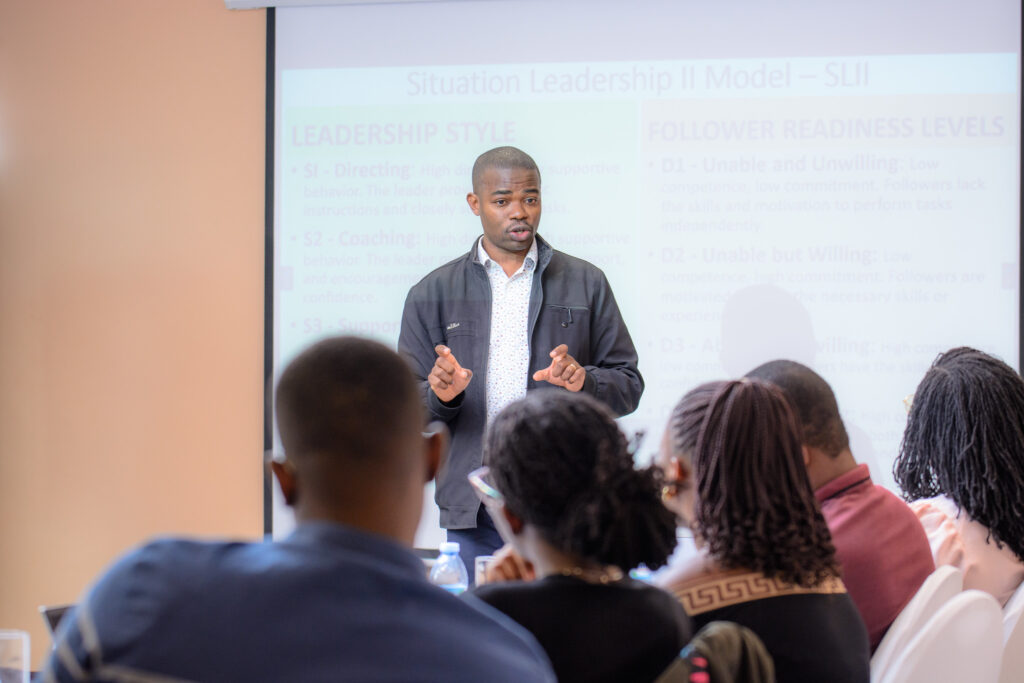
Andrew Arinaitwe, one of the Huduma Fellows, offered a nuanced perspective, suggesting that while management focuses on the operational aspects, leadership is inherently visionary. This distinction resonated with many and highlighted the broader scope of leadership compared to the more task-oriented nature of management. The discussion underscored that effective leadership often encompasses managerial skills but extends beyond them to include inspiration, vision, and influence.
Matanda Abubaker, another fellow, shared a compelling anecdote from his own leadership journey. He recounted a pivotal moment where a crisis emerged under his watch, prompting his close associates to step up and address the situation. This experience led to a profound realization: “A crisis can potentially choose its leader.” This revelation underscored the unpredictable nature of leadership and the imperative of adaptability in navigating complex scenarios.
“Gone are the days where people were taught how to do things; lately, people are taught how to think solutions,”
Bright Malere
Building on these discussions, Bright introduced the concept of adaptive leadership. He emphasized the importance of taking stock of the root causes of a situation and responding with agility and creativity. “Gone are the days where people were taught how to do things; lately, people are taught how to think solutions,” he remarked. This assertion marked a significant shift from traditional leadership training, which often focused on predefined procedures, to a more dynamic approach that encourages innovative problem-solving.
Throughout the session, Bright’s insights encouraged introspection among the participants, prompting them to evaluate their own leadership styles and strategies for handling diverse situations. By intertwining theoretical concepts with real-world anecdotes, he fostered an environment of collaborative learning and collective growth. As the first session of the Huduma workshop drew to a close, the fellows departed with newfound perspectives and a renewed sense of purpose, ready to apply their learnings in their personal and professional lives.
Navigating Uganda’s Digitization Agenda: Tony Bbosa’s Insights
During the workshop weekend, the fellows were treated to an enlightening session by Tony Bbosa, the Manager of Government Systems at NITA-U, who delved into Uganda’s digitization agenda. With a wealth of knowledge and experience in the field, Bbosa provided invaluable insights into the country’s efforts to embrace digital transformation.
Bbosa commenced his session by shedding light on the criteria used to appraise the digitization trajectory of any nation. He outlined key indicators, including the availability of government information online, the feasibility of online interactions with government entities, and the seamless execution of online transactions for services. These indicators serve as benchmarks for assessing the progress and effectiveness of a country’s digitization efforts.
Highlighting Uganda’s progress in digital infrastructure, Bbosa proudly showcased the Tier 3 data center, a cornerstone of the country’s digital ecosystem. He stressed its reliability, boasting that it can withstand any data failure, making it the only one of its kind in East Africa. This achievement marks a significant milestone in Uganda’s journey towards digital resilience and security.
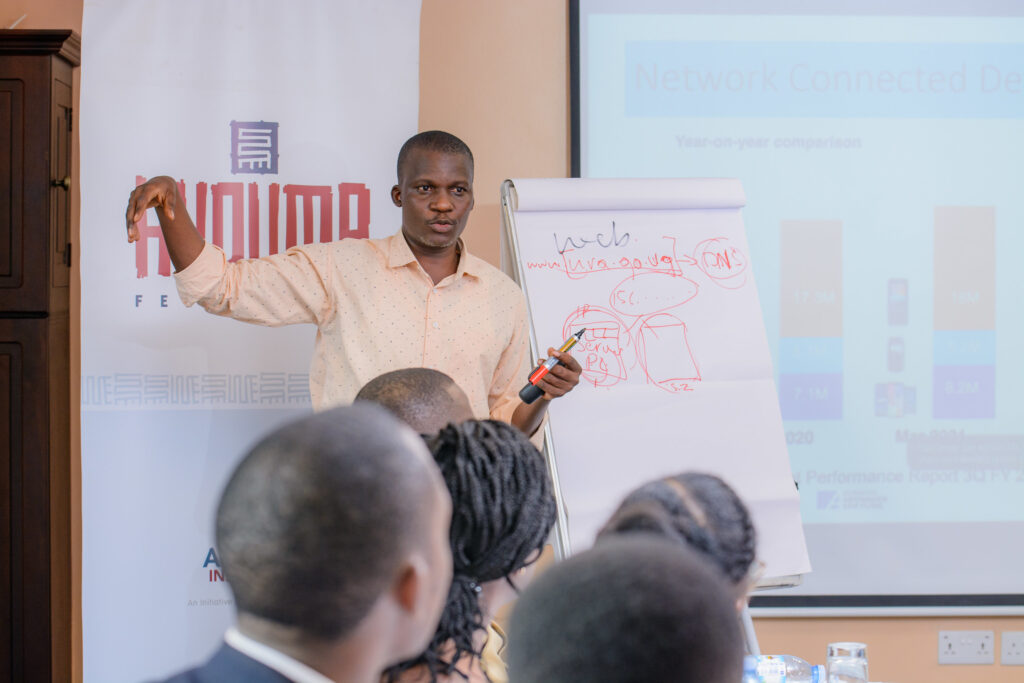
However, Bbosa acknowledged the challenges that hinder the government’s pace of digitization, attributing them to the intricate nature of various moving parts within the system. The integration of different governmental systems and ensuring interoperability among them is a complex task that requires meticulous planning and execution.
In addressing the issue of public service electronic extension, Bbosa underscored the importance of user-friendly platforms. He pointed out that while mobile apps for e-governance services are convenient, they are also easily uninstallable, posing a challenge for user retention. Thus, he advocated for the prioritization of web-based services, which offer greater usability and accessibility. This approach ensures that citizens can consistently access and utilize government services without the risk of app deletion.
Irene Mutuzo, a tech enthusiast and academic, added her insights to the discussion by proposing the ETIAS model for Africa. This model aims to harmonize cross-border travel and streamline e-governance services by consolidating them into one government wallet. Irene also emphasized the need for a unified identification system, suggesting that a single identification medium could eliminate the need for multiple documents such as national IDs and driving permits. This proposal highlights the potential for significant efficiency gains and simplification of processes in government services.
Bbosa’s session served as a catalyst for thought-provoking discussions among the Huduma fellows. It underscored the importance of embracing digital innovation to enhance government services and improve efficiency. The insights shared by Bbosa, combined with the collaborative efforts of individuals like Irene, will undoubtedly play a pivotal role in shaping Uganda’s digital future. As Uganda continues on its digitization journey, the knowledge and perspectives gained from this session will be instrumental in driving progress and overcoming challenges.
Governance and Public Management: William Babigumira’s Perspective
William Babigumira, Head of Faculty at the Leo Africa Institute, provided a comprehensive session on the intricate relationships between public sector agencies, citizen publics, and civil society. His insights offered a thorough understanding of the modern governance landscape and the transformation of public management.
Babigumira began his session by highlighting the critical role institutions play in governing modern economies. He pointed out that the management of economies has evolved significantly, necessitating a shift towards new public management paradigms. This shift is exemplified by practices like community policing, which focus on building trust and collaboration between public servants and the communities they serve.
To engage the fellows, Babigumira posed a provocative question about their honest perceptions of policemen. One fellow, Christelle, humorously remarked, “They always come to collect,” a sentiment echoed by others. Babigumira used this interaction to discuss the importance of police living among community members rather than being isolated in barracks. He argued that close interaction between police and community members helps to build trust and break down barriers. This approach fosters a sense of mutual understanding and cooperation, which is essential for effective governance and public safety.
The session then shifted to the topic of comparative governance. Babigumira emphasized that countries should not operate in isolation, using tax collection as a key example. He noted that while different districts in Uganda have varying capacities to generate tax revenue, the distribution of these revenues does not reflect these disparities. This inequity leads to challenges in resource allocation and service delivery across regions. Babigumira’s discussion highlighted the need for governance styles to evolve from being citizen-centric to citizen-driven, where the focus is on meeting the actual needs and aspirations of the citizens.
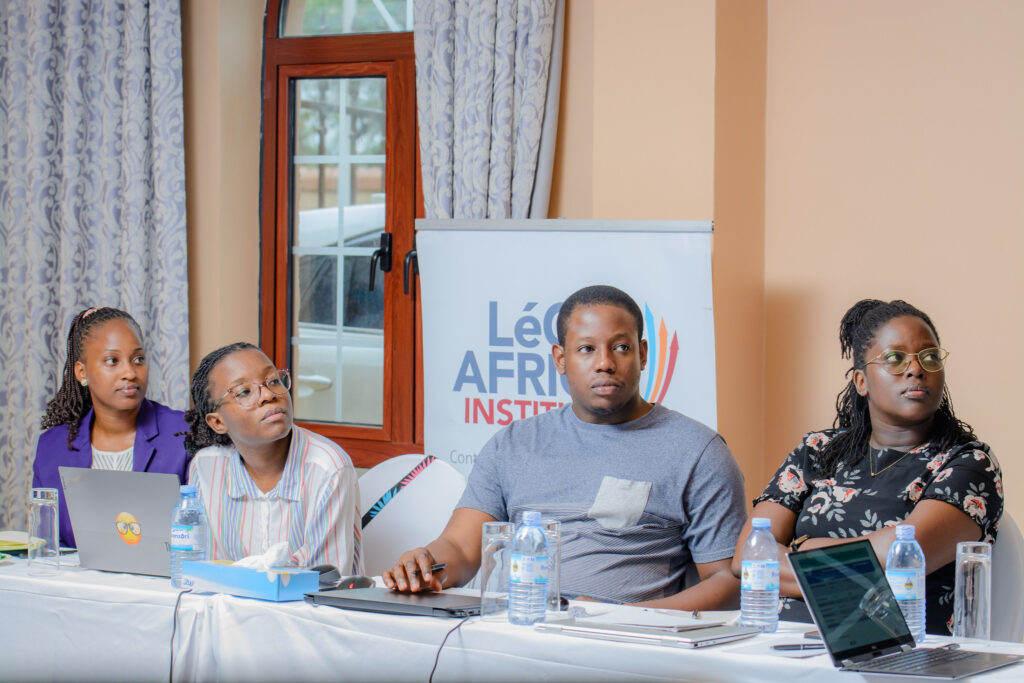
The fellows engaged in a broader discussion on the need for governance practices to be adaptive and responsive. They explored the importance of incorporating citizen feedback and participation in the decision-making process to ensure that governance is truly reflective of the people’s will. This approach not only enhances the legitimacy of governmental actions but also fosters a sense of ownership and responsibility among citizens.
William Babigumira’s session offered profound insights into the nexus between public sector agencies, citizens, and civil society. By exploring modern public management practices and advocating for a more integrated and community-focused approach, Babigumira inspired the fellows to think critically about governance and their roles as future leaders. His emphasis on comparative governance and the need for a citizen-driven approach highlighted the importance of adapting governance practices to better serve the public. This engaging session not only deepened the fellows’ understanding of public management but also encouraged them to consider innovative approaches to governance. With leaders like Babigumira guiding the discourse, the Huduma Fellowship continues to cultivate a generation of informed and proactive public servants ready to make a meaningful impact.
Nurturing Character: Awel Uwihanganye’s Insights
In the serene ambiance of the Huduma Fellowship workshop weekend, where emerging leaders converge to hone their skills, the third faculty member’s session illuminated the significance of character development in shaping impactful leadership journeys. Awel Uwihanganye, known for his inspiring leadership philosophy, blended wisdom, humor, and profound insights to delve into the transformative power of personality evolution and the pivotal role it plays in leadership excellence.
Uwihanganye kicked off the session with a thought-provoking question directed at the 30-year-olds in the room, teasingly probing into the intersection of age and social dynamics. This lighthearted icebreaker set the stage for a deeper exploration into the essence of character and its enduring impact on personal and professional endeavors.
“Character is the most important thing you can invest in your early years,”
Awel UWIHANGANYE
“Character is the most important thing you can invest in your early years,” remarked Uwihanganye, emphasizing the foundational role of character in shaping one’s trajectory in life. He posed a rhetorical query, “What do people say about you when you’re not in the room?”, underscoring the essence of reputation and integrity. This question prompted fellows to reflect on how their actions and behaviors shape others’ perceptions of them, even in their absence.
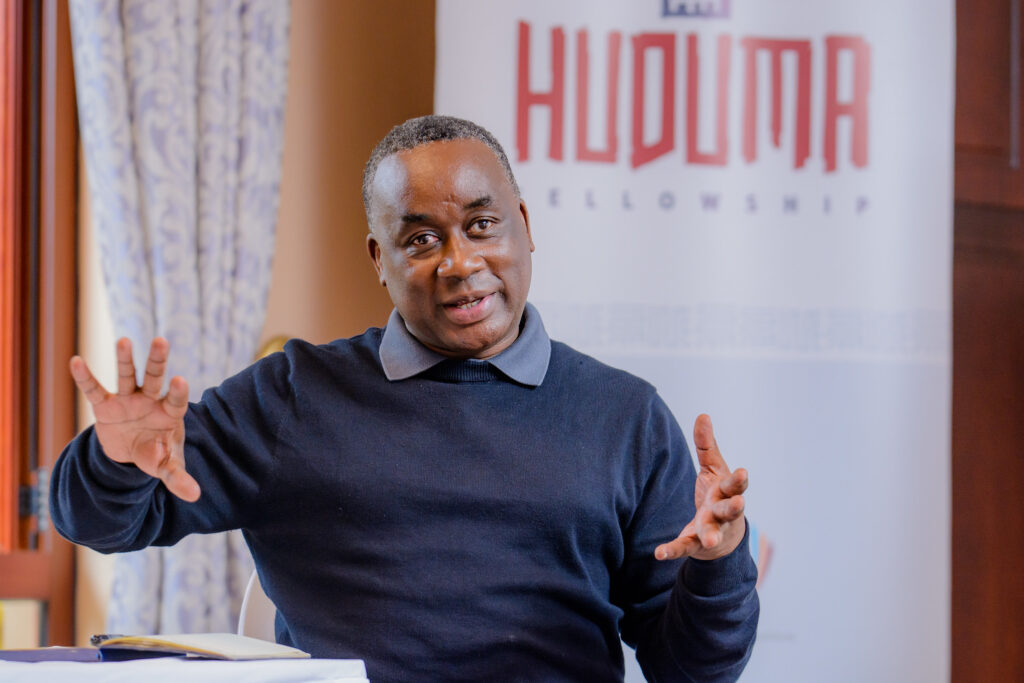
Building upon this foundation, Uwihanganye espoused the importance of cultivating a social network characterized by shared values, purpose, and character. He encouraged participants to surround themselves with individuals who embody integrity and like-mindedness, emphasizing the role of peer influence in nurturing personal growth and accountability. This advice highlighted the importance of choosing one’s associations wisely, as they significantly impact one’s development and success.
Reflecting on the formative years of one’s twenties, Uwihanganye offered a refreshing perspective on the value of making mistakes and embracing the journey of self-learning and discovery. “You can make mistakes in your 20s, and people can forgive you because it is the self-learning and teaching phase of life,” he quipped, instilling a sense of resilience and optimism in navigating life’s inevitable challenges. This perspective encouraged the fellows to view their mistakes as valuable learning experiences rather than setbacks.
Central to Uwihanganye’s discourse was the notion of building a strong, daring character—one that is imbued with resilience, curiosity, and a willingness to venture into the realm of the impossible. Encouraging participants to embrace an outward-looking mindset, he implored them to pursue audacious goals and embrace new experiences with zeal and determination. This mindset, he argued, is crucial for achieving greatness and making a significant impact in the world.
As the session concluded, participants departed with a renewed sense of purpose and a deeper appreciation for the transformative power of character development. Uwihanganye’s insights had ignited a spark of introspection and motivation, propelling them towards a path of authentic leadership and meaningful impact. His guidance provided the fellows with the tools and mindset needed to cultivate a strong, resilient character—one that serves as the bedrock of their journey towards realizing their fullest potential and making a lasting difference in the world.
In a nutshell, the Huduma Fellowship workshop weekend offered a rich and diverse learning experience, covering key aspects of leadership, digitization, governance, and character development. Each session, led by experienced faculty members, provided valuable insights and fostered a collaborative learning environment. Bright Malere’s discussion on situational leadership and personal inventory set the stage for introspection and adaptive leadership strategies. Tony Bbosa’s exploration of Uganda’s digitization agenda highlighted the importance of digital innovation in enhancing government services. William Babigumira’s insights into governance and public management underscored the need for citizen-driven approaches and equitable resource distribution. Finally, Awel Uwihanganye’s session on character development emphasized the foundational role of character in leadership excellence and personal growth.
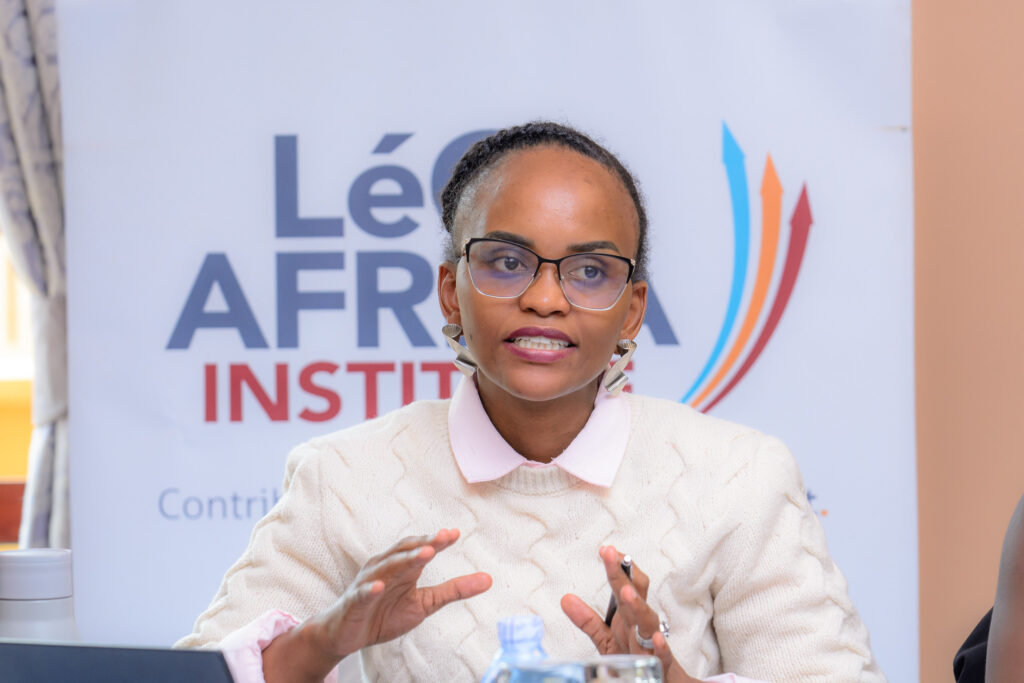
As the fellows continue their journey, the knowledge and perspectives gained from this workshop will undoubtedly equip them with the tools and mindset needed to make a lasting impact in their communities and beyond. The Huduma Fellowship, through its comprehensive and transformative workshops, continues to cultivate a generation of informed, resilient, and proactive leaders ready to address the complex challenges of the modern world and drive positive change.
Worshop II will take place over the weekend of 23 – 25 August 2024.
Proceed to see pictures from the weekend, here.

